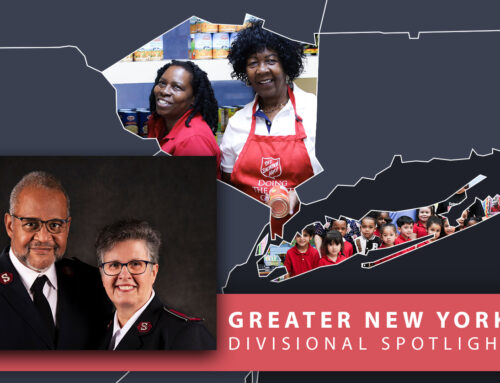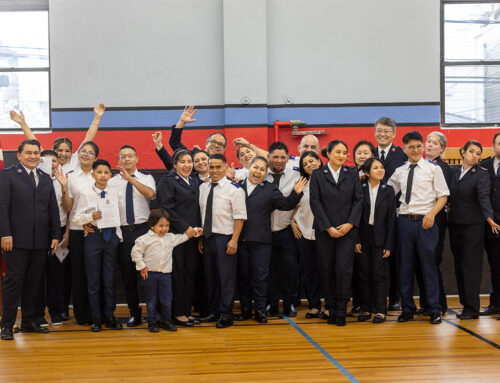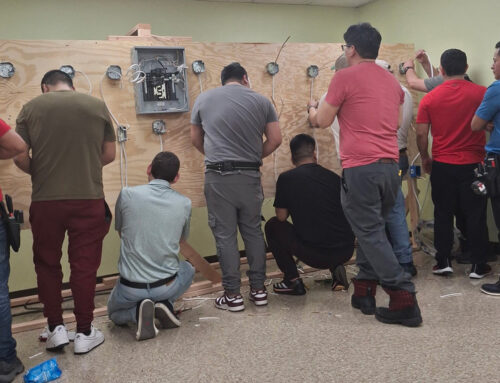
A Ministry of Three
by Hugo Bravo
Lieutenant Brian Perks, assistant pastor at The Salvation Army in Laconia, N.H., knows that ending the cycle of poverty involves more than just providing a meal and a space to sleep for a night.
“You can’t just give a homeless person an apartment with a bed and say, ‘case closed.’ I have met people who received help and even a place to live, but were back on the streets in a few months,” Perks says. “They needed the tools to rebuild their lives, reestablish their income, and become productive members of society. There was no infrastructure built to help them become successful.”
Today, The Salvation Army in Laconia is made up of a church, thrift store, and the Carey House Homeless Shelter, which form the needed infrastructure. Shelter residents depend on the store and the church to support their progress toward self–sufficiency.
Captains Scott and Nora McNeil served as pastors in Laconia from 2014–2020. Captain Nora says, “Some people like to call it the ‘Trifecta.’ But that’s a betting term, and The Salvation Army doesn’t gamble. I prefer calling it the ‘Three–Ring Circus;’ a lot of acts are going on at the same time to keep the show going.” The McNeils say that their years at Laconia have been some of their most special in ministry.
Captain Scott says, “We worked hard to make sure the three entities all operated as one. In doing so, we saw William Booth’s mission come to life at Laconia.”
Order in the house
Every rule in the Carey House is in place to protect the children who live there with their families. Of all the residents at Carey, the children are the only ones who had absolutely no say in the decision to live there.
“We need to always be considerate and flexible regarding these families, as would any place where we are in charge of kids,” says Captain Nora.
However, the Carey House is 100 percent drug and alcohol free and that rule stands.
“When residents came to stay in the Carey House, I let them know that they might be used to living with no boundaries and doing what felt good to them,” says Captain Scott. “But If they’re in here doing something that feels good that can negatively affect others, then they cannot stay.”
“Some of the members of the Carey House who leave for other places, come back, and say, ‘I was better here because we had rules. Give me something that can help me be accountable for my actions,’” says Captain Scott.
“We had a resident named Scotty who became a big part of the Laconia Corps. Scotty came to church, men’s groups, and bible study. He even became a Salvation Army adherent,” says Captain Nora.
Scotty had lost his wife to cancer, and he had developed cancer too. As his own condition worsened, he said he did not want to die in a hospital and asked if he could stay at the Carey House.
“We brought in the hospice to make him comfortable, and he passed away among the people that he considered his family,” says Captain Nora. “He is one of many stories from here, and it would only take one to consider this work a blessing.”
Resources for the recovery
The thrift store is located half a mile from the church and the Carey House. While other Salvation Army thrift stores help fund its Adult Rehabilitation Centers (ARCs), Laconia’s store allocates funds to the shelter and its community programs. It also plays a crucial part in bringing residents of the Carey House back into structured personal and work life.
“When people come to us, sometimes they don’t believe that their life has any value, or that we would trust them to do any job,” says Captain Scott. “So, we start them with a simple task, like counting puzzle pieces and making sure the puzzle is complete and can be sold. Soon, they’re being put in charge of the toy room and preparing every toy to for the store.”
“Being part of the thrift store is a valuable resource for a resident’s future,” says Lieutenant Brian. “If they’re working or volunteering for us, they’re developing a work history. Now we can vouch for them and talk to an employer about their work experience.”
“The store helps shelter residents up to the day they move to a permanent home,” says Captain Nora. “They can get what they need in their new place from our store, and the money they save can help pay their rent.”
Building for the future
The Laconia Corps welcomes members of the Carey House to participate in the services and ministries. The church also helps with the unique needs that come with sheltering a family. For example, corps volunteers help watch the children if their parents need to finish chores, see about a job, or take time for themselves.
“When you talk about parents needing a sitter, you might think of caring for babies,” says Lieutenant Brian. “But we had a 17–year– old who had the day off from school and came to volunteer at the church while his mother went to work. He learned about the Army, but it was even more important to make sure that young man was not alone. We wanted to add some enrichment to his life, if only for a day.”
Seeing the children from the Carey House get involved in the corps is a blessing that can end in sadness, says Lieutenant Brian. If that child’s parents find a place to live away from Laconia, it can feel bittersweet seeing them leave. The Laconia Corps helps transport them to their new home, get set up with belongings, and introduce them to a local Salvation Army church.
“Our loss will be that corps’ gain,” says Lieutenant Brian.
Open listening
“This type of ministry can sometimes be hard and lonely,” admits Captain Scott. “I tell young officers that when you work with homeless people, you need a thick skin, because at times you will feel attacked and disappointed. But we must always try to look for the bright parts of the work we do and carry that brightness with us.”
“As long as you are loving Jesus’ people where they are, and where they need to be, He will protect and guide you,” says Captain Nora.
The Salvation Army’s triple presence in Laconia has seen many success stories. But Lieutenant Brian says residents at the Carey House must be welcomed and heard before any recovery begins.
“Listening is the most undervalued thing that we can do for anyone who comes to us,” says Lieutenant Brian. “Oftentimes, an individual doesn’t necessarily want you to swoop them up and fix every problem they have. They just want someone who will listen. No one has done that for them in years, even when they’ve tried to share their story and get everything out in the open.”
This approach is what lets people, and even whole families, know that The Salvation Army has opened its heart to them. In turn, they become open to what the Army can do for them.
“Listen to them, care about them, and then say, ‘Okay, so that’s where you’ve been. Now let’s talk about where you’re going,’” says Lieutenant Brian. “Those simple words have saved lives.”
Read more from the latest issue of SAconnects.




